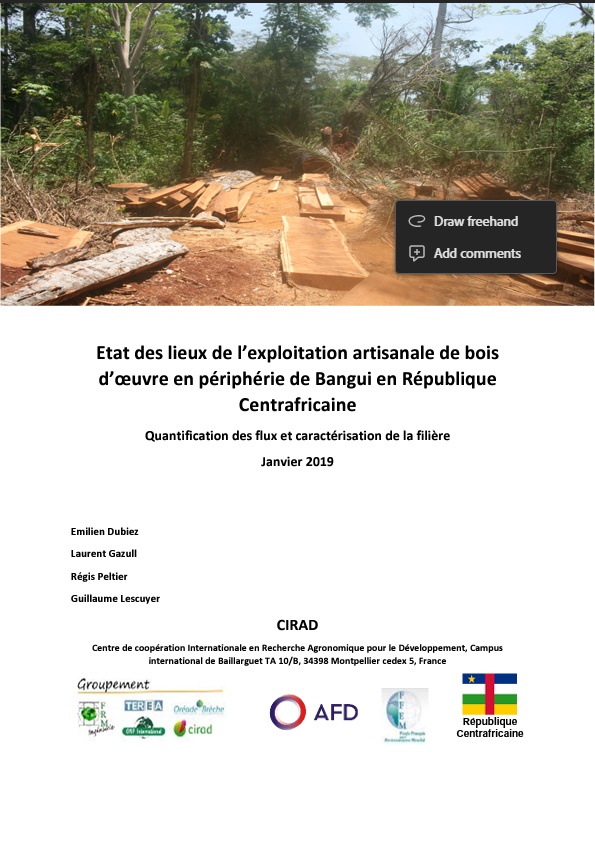LandMark: Global Platform of Indigenous and Community Lands
Etat des lieux de l'exploitation artisanale de bois d'oeuvre en périphérie de Bangui en République centrafricaine.
Cette étude a été réalisée dans le cadre du Projet de développement de la Région Sud-Ouest (PDRSO), projet financé par l’Agence française de développement (AFD).
L’étude avait pour objectifs de :
- quantifier les flux de sciages artisanaux de bois d’œuvre entrant et sortant de Bangui,
- Caractériser cette filière.
Elle a été conduite dans le cadre du Projet de développement régional du Sud-Ouest (PDRSO) qui a débuté ses activités en octobre 2016 et dont les objectifs spécifiques sont :
Impact of Differences in Land Management on Natural Vegetation in Semi-Dry Areas: The Case Study of the Adi Zaboy Watershed in the Kilite Awlaelo District, Eastern Tigray Region, Ethiopia
The search for a sustainable land management has become a universal issue. It is especially necessary to discuss sustainable land management and to secure a site with enough feed supply to improve the lives of the farmers in the Ethiopian Highlands.
Seeking Environmental Sustainability in Dryland Forestry
Forestry systems, including afforestation and reforestation land uses, are prevalent in drylands and aimed at restoring degraded lands and halting desertification. However, an increasing amount of literature has alerted potentially adverse ecological and environmental impacts of this land use, risking a wide range of ecosystem functions and services. The objective of this paper is to demonstrate the potentially adverse implications of dryland forestry and highlight the caution needed when planning and establishing such systems.
The Forest–Water Nexus: An International Perspective
Discussions on the relationships between forests and water have primarily focused on the biophysical nature of these relationships. However, as issues such as land degradation affect the ability of forests to provide water-related ecosystem services resulting in water insecurity, the human dimension of the forest–water nexus has become more evident. This has resulted in the identification of the forest–water nexus as an issue that requires urgent recognition within major international policy processes and where knowledge gaps on the global state of the nexus exist.
Land Restoration in Latin America and the Caribbean: An Overview of Recent, Ongoing and Planned Restoration Initiatives and Their Potential for Climate Change Mitigation
Land degradation is a globally recognized problem and restoration of degraded land is currently high on the international agenda. Forest landscape restoration and other restorative ecosystem management activities are important measures that contribute towards reaching the objectives of the Bonn Challenge, which aims to restore 350 million hectares by 2030. In this context, many restoration projects are being planned and implemented in Latin America and the Caribbean (LAC).
Assessing Forest Governance in the Countries of the Greater Mekong Subregion
The forest landscapes of the Greater Mekong Subregion (GMS) are changing dramatically, with a multitude of impacts from local to global levels. These changes invariably have their foundations in forest governance. The aim of this paper is to assess perceptions of key stakeholders regarding the state of forest governance in the countries of the GMS. The work is based on a quantitative and qualitative analysis of the perceptions of forest governance in the five GMS countries, involving 762 representatives from government, civil society, news media, and rural communities.
Sustainable Development Goals and the Forest Sector—A Complex Relationship
The United Nations adopted the Agenda 2030 with its core element, the 17 Sustainable Development Goals (SDGs), in September 2015. In order to achieve these goals within the coming years, intense efforts are required by all political and societal actors. Although the first definitions of sustainable development referred to the forest sector, the question remains: what contribution can forestry make to achieving the Sustainable Development Goals?
Forestland Concession, Land Rights, and Livelihood Changes of Ethnic Minorities: The Case of the Madhupur Sal Forest, Bangladesh
Forestland concession has been the dominant governance tool for the acquisition of natural state-owned forest resources in many tropical countries, including Bangladesh. Moreover, the forestland concession process confers the holder a bundle of rights. The Sal forests of Bangladesh are treated as some of the greatest concession forests, as a number of ethnic minorities use these forests for their daily living.









